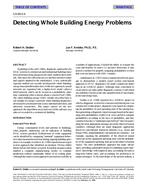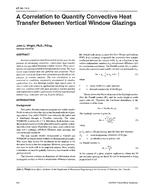Currently, the electronics industry such as integrated circuit (IC) industry is primarily composed of high-tech Original Equipment Manufacturers (OEM) and Original Design Manufacturers (ODM) in Taiwan. The electronics IC industry is not only capital- and technology-intensive, but also energy-intensive. Since the Kyoto Global Warming Conference in December 1997, understanding and mitigating the emission of carbon dioxide (CO2) from industrial processes has become an important issue. The goals of this study are to develop referencing information by obtaining specific energy consumption data from the IC industry, which can be used by the industries, plant builders, energy companies, and government agencies to identify opportunities and enhance energy efficiency in the IC industry. Specifically, this study focuses on SEC for two sectors in the IC industry – the IC assembly and testing that are the back-end stage processes in IC manufacturing. We quantified levels of SEC through benchmarking the energy consumption data for a selected group of fabrication plants (hereafter referred to as “fabs”) at their maximal capacity, which was defined as the greatest number of output that the fab can produce under normal conditions with existing resources. The “capacity utilization” of a fab refers to the ratio of actual total output to the maximal capacity. In this study, the total 11 fabs’ capacity accounts for more than 60% of the total national capacity for IC industry in Taiwan. We have found that facility systems and process tools shared the major portion of the power consumption by 53% and 47% respectively in all participated IC A/T fabs. The average cooling load of the IC A/T fabs ranged from 0.09 to 0.31 USRT/m2. For IC assembly fabs studied, when their capacity utilization were 100%, the SEC ranged from 21.2 kWh/k pieces to 119.4 kWh/k pieces, with an average of 48.1 kWh/k pieces. For IC testing fabs studied, when their capacity utilization were 100%, the SEC ranged from 76.3 kWh/k pieces to 201.1 kWh/k pieces, with an average of 122.2 kWh/k pieces. We estimated that if all the IC A/T fabs in Taiwan achieved the level of specific energy consumption of the best performer (i.e., lowest SEC level) among the 11 surveyed fabs studied in this paper, the annual energy savings and of CO2-emission reduction from the IC A/T industry Taiwan would be expected to reach 258,847,000 kWh/year and 164,886 tons, respectively. In addition, an innovative energy efficient design of the cleanroom ventilation system is proposed to save energy use in the IC A/T fabs. A better design and control can save fan energy by more than 20%.
Units: SI
Citation: ASHRAE Transactions, vol. 115, pt. 2, Louisville 2009
Product Details
- Published:
- 2009
- Number of Pages:
- 9
- File Size:
- 1 file , 480 KB
- Product Code(s):
- D-LO-09-025


